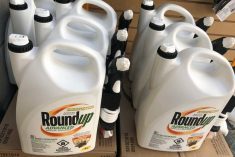China’s decision to stop buying Canadian canola has prompted some farmers to push the panic button — trying to sell what they have in their bins before things get any worse.
But those calling FarmLink Marketing Solutions are being told to hold off on making any hasty moves.
“This is a premium oilseed,” said Neil Townsend, chief market analyst of the Winnipeg company. “There should be some demand for it because the price got cheaper. All of the other metrics on it are fairly positive.”
Read Also

Farming Smarter receives financial boost from Alberta government for potato research
Farming Smarter near Lethbridge got a boost to its research equipment, thanks to the Alberta government’s increase in funding for research associations.
But that doesn’t mean he expects a quick rebound in canola’s fortunes. Like most market watchers, Townsend sees China’s move to stop buying Canadian canola as retaliation for the detention of Huawei chief financial officer Meng Wanzhou (who is facing extradition to the U.S.).
“It’s a conundrum because I think the real reason why we’re having problems is the detention of the Huawei lady in Vancouver,” he said. “That makes it political, which makes it harder to uninstall.
“If it were some sort of foreign matter in the cargo, steps could be taken to address that. But I think they’ll find it very hard to negotiate with the Chinese.”
China’s purchases of canola were affected soon after Meng was arrested in December even though nothing was officially announced, said Ed Baldwin, manager of marketing services for AgChieve Grain Marketing in Winnipeg. When inspectors began taking longer to approve shipments and dragging their feet on paperwork, buyers in that country quickly realized something was happening, he said.
“It was making it hard for Chinese crushers to get their product, and they weren’t that keen on buying more,” he said.
But like Townsend, Baldwin is advising farmers to not rush sales even as many need to free up bin space in the coming months.
“There is still some opportunity ahead,” he said. “We often see as we go into our spring seeding season, there’s always a sign of something that might hurt the canola yield, and the market strengthens.
“Let’s call it a seasonal type of rally that we may get to see in May-June as the canola is back in the ground.”
And don’t forget there is legitimate demand for canola oil and meal, both in China and worldwide, added Townsend.
“At some point, they will need to allow some in, because they will find it hard to replace their canola meal needs with other sources of canola in the world,” he said. “They will have to substitute in soybeans or some other vegetable oils, which have their limits because they don’t have as much oil in the seed and they don’t have as many ‘front of the box’ claims for health that canola oil has.
“That could get them to change their minds.”
Alternatively, there might be a backdoor route into China, said Baldwin.
“I can’t tell you what countries they are (but) the idea is that it will shift the destinations from China to other countries like Bangladesh or some other Asian country, or maybe Europe, that will filter their canola into China and open doors there,” he said.
A drop in canola prices should boost sales elsewhere, said Townsend.
“Now we’ve made canola, which is a premium vegetable source, cheaper,” said Townsend. “I would imagine that some countries, particularly the United Arab Emirates, would be interested in buying more because they’re a processor.
“If it gets cheaper, you would think they would want to process it a bit more and sell to buyers at the other end.”
Japan and Pakistan will also likely buy more from Canada, he said.
But nothing is going to replace a buyer that accounted for 40 per cent of canola sales, both men warned. So expect stockpiles to grow.
“The other place canola ends up is in the ending stocks,” said Townsend.
Prior to the Meng affair, StatsCan had been predicting year-end stocks would hit 2.6 million tonnes (up slightly from the 2.5 million tonnes at the end of the 2017-18 crop year). But Townsend expects they will now reach 3.5 million tonnes — a new record.
Lower prices may also tempt crushers in Canada but again, the effect will be limited. While crush levels fell in February, Baldwin noted the domestic crushing sector is running at high capacity. Even with the February drop (to 636,000 tonnes, well below the recent monthly average of 780,000 tonnes), the sector is still ahead of year-ago crush levels.
So if panic selling is out, what should producers do?
Since most farmers aren’t in a position to significantly cut back on canola acreage, they need to be prepared and realistic, said Townsend.
That means knowing your cost of production, establishing price points that you can live with, and pulling the trigger quickly when prices hit that level, he said.
It’s far from an ideal situation, he added. Not only have farmers taken a hit from India dropping out of the pulse market and a wheat rally that fizzled out too quickly, they are faced with rising costs and higher interest rates.
“Farmers are not feeling as good about themselves as they were five years ago when they were all trying to buy more land,” said Townsend. “This is just another thing that is not a piece of good news for this year.”
















